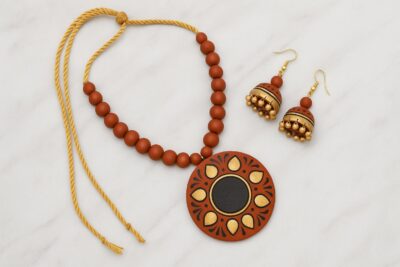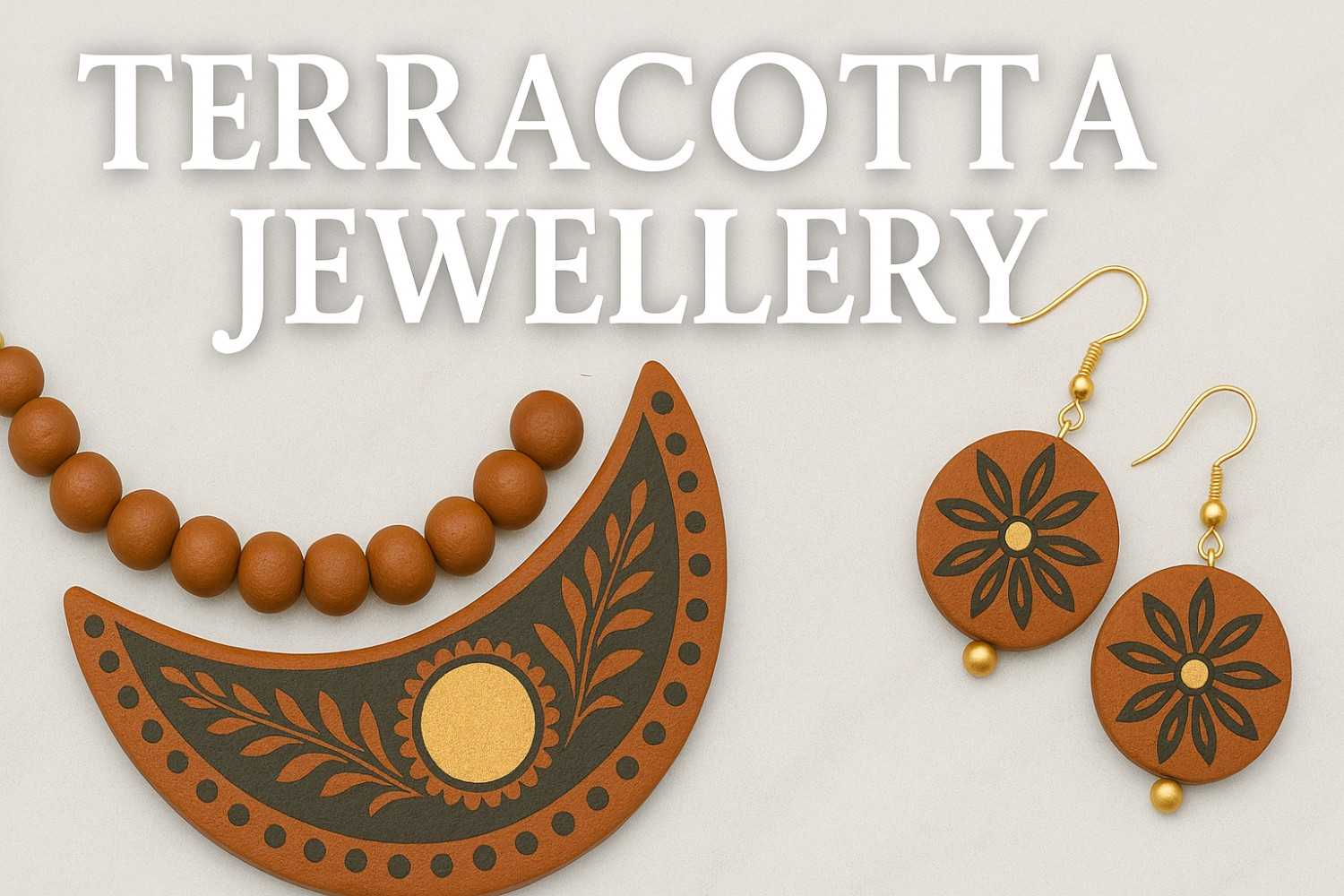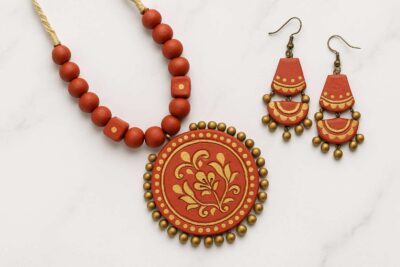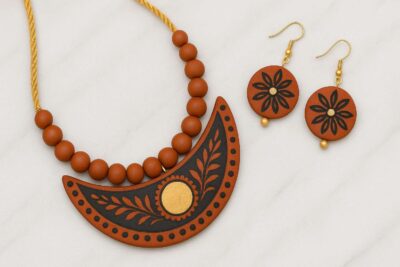Terracotta Jewellery: The Earthy Elegance Redefining Sustainable Fashion
The use of terracotta jewellery is steadily increasing these days because of sustainable fashion. Fashion sustainability is no longer just an option, but rather, a way of life. The adornment is tribal in origin, yet has contemporary polish; in no other ornament can one find a whole eco-friendly accessory that fuses art, culture, and earth-friendly fashion.
The jewellery is made of natural earth, which is shaped and fired, both as an artistic expression of India’s conventional craftsmanship and a stylish substitute for metal and plastic jewellery. It makes a constant fashion statement and matches with one’s ethnic and bohemian outfits, while adapting to eco-friendly options.
This article has a broad scope, that is to say, history, production processes, various styles, marketing and the reasons behind the exploding popularity of terracotta jewellery in the fashion and lifestyle sector.
🌍 What Is Terracotta Jewellery?
Terracotta comes from the Latin words ‘terra’, which means ‘earth’ and ‘cotta’, which means ‘baked’; thus, together means baked earth or clay. As for jewellery, Terracotta means the artistry of sculpting raw clay into exquisitely detailed pieces and firing them in a kiln or through open flame.
Terracotta jewellery is:
- Handcrafted from start to finish
- Biodegradable and eco-friendly
- Light in weight and gentle on the skin
- Customizable in numerous shades and patterns
What makes this unique is the blend of contemporary and traditional styles it captures. The rustic charm, rich texture, and earthly elegance make it enduring and timeless.
🏺 Historical Roots of Terracotta Jewellery
An ancient form of art known to mankind, terracotta surfaces as one of the oldest forms of art. Throughout ancient history, including the Indus Valley civilisation, rural Bengal, and even Tamil Nadu, terracotta artefacts served for practical and decorative purposes.
In the past, terracotta jewellery was worn for rituals, festivals, and temple ceremonies. Today, this ancient art form is being revived as modern designers incorporate tribal, folk, and urban elements into contemporary jewellery collections.

🔑 Key features of terracotta jewellery
This is the reason why terracotta jewellery is gaining popularity in both rural and urban markets:
✅ 1.
Eco-Friendly Material
This is a notable sustainable jewellery choice because it is made of natural clay which is baked without toxic chemicals in the same way as plastics and jewelries made of metals.
✅ 2. Handcrafted Beauty
Every item is uniquely designed because every item is individually and carefully hand-painted and shaped. As a result of artistry, there is not one piece which is identical to another.
✅ 3. Affordable Luxury
Even though it has a bit of an artisanal touch, terracotta jewellery is still remains within the budget for most. This is in turn means that everybody has the opportunity to purchase exquisite jewellery.
✅ 4. Culturally Rich Designs
Wearing terracotta jewellery is a statement as it adds heritage along with a story to your personality. The folklore, mythology, tribal art, temple architecture, and nature are some of the inspirations for these designs.
✅ 5. Versatile Fashion Accessory
Terracotta jewellery comes in various styles from chunky statement necklaces to more subtle and delicate earrings, which cater to different age groups and fashion preferences.
*Making Terracotta Jewellery*
Creating terracotta jewellery pieces is an artistic process that honours ancient traditions:
*Clay Preparing Step*: Nature clay is cleaned by sifting and kneading it to remove impurities.
Moulding: Using his/her hands or special moulds, an artisan sculpts the clay into the respective items: figurines, earrings, and pendants.
Drying: For two to three days, the clay pieces are under the hot sun.
Firing: The items are subjected to open flames or kilns until the terracotta is reached.
Painting: The jewellery items are then fired and painted with the following: eco-friendly paints, acrylics, and gold or silver pigments.
Assembly: The item is finished, and its intricate parts, like jute cords, hooks, and strings, were added.
The elegance of the piece is terracotta is earthy and beautiful, but most importantly, it is eco-friendly.
*Categories Of Terracotta Jewellery*
Terracotta jewellery can be found in different kinds of styles, but some of them are:
*1. Terracotta Necklaces*
They are the most expressive and bold parts of the jewellery, with an enormous range of styles. The various styles include: tribal chokers, long chains tall temple-inspired.
*2. Terracotta Earrings*
Causal and festive are two categories of earrings that include jhumka, hung, studs and tribal hoops.
*3. Terracotta Bangles & Bracelets*
Paired with ethnic and Bollywood-inspired clothing are the painted rustic bangles and meticulous hand-debossed motifs.
*4. Terracotta Rings*
Layering outfits with boho or simplistic ensembles, which include the ring, will give it an earthy texture, is the chunky round rings.
*5. Terracotta Pendants*
Each pendant can be worn on its own or matched with earrings, making them bold and attention-grabbing.
*6. Customised Pieces*
Several craftsmen and women provide customizable terracotta jewellery and will create it with name initials, deity images, or even bespoke texts.
👗 Styling Tips For Terracotta Jewellery
Terracotta jewellery is easy to style as it has a subtle yet creative appeal. Here are a few suggestions:
🌸 Ethnic Elegance
Wear sarees and salwars or handwoven kurtas with a painted terracotta necklace and jhumkas. Red, mustard and earthy brown are ideal color choices.
🌼 Indo-Western Fusion
Dress up in a plain maxi or shirt-dress and accessorise with a bold terracotta pendant. Finish off with tribal earrings or bangles to achieve this style.
🌿 Casual Everyday Look
Tip: For a more polished everyday style, a simple kurti or a cotton dress can be elevated with light terracotta stud earrings or finger rings.
🎉 Festive & Traditional
For weddings, pujās, and Diwali parties, bold temple-style sets with golden paint are fine. Smokey eyes and a bun complete the look.
💚 The Benefits Of Wearing Terracotta Jewellery
Hypoallergenic – No harsh chemicals or allergens
Eco-friendly – Materials are biodegradable
Artisan support – The Product is made by village men and women
Distinctive – Every piece is different
Preserves the living Indian culture and tradition.
🧼 What is the Best Way to Care for Terracotta Jewelry
Taking care of terracotta jewellery means taking care of the following steps
✅ Do
- Store in a dry, airtight box
- Use a soft, dry cloth to wipe the jewellery after it is worn
- Perfume and water should be kept away
- Use bubble wrap when transporting
❌ Don’t:
- Soaking or washing the jewellery in water is a definite no
- Leaving the jewellery on surfaces leads to breakage
- Long exposure to sunlight causes damage
- With proper care, the jewellery keeps its shape, colour, and finish for many years
🛍️ Buying Terracotta Jewellery
You can purchase terracotta jewellery from these places:
🏡 Local Markets and Fairs
- Dilli Haat in Delhi
- Shantiniketan Haat in West Bengal
- Kala Ghoda Festival in Mumbai
- Other local exhibitions and melas or handloom expos
By buying from local artisans, you are supporting their business. Encourage these artisans by purchasing directly when you can.
🛍️ Where to Buy Jewellery
You can shop for authentic jewellery online or offline:
EarthlyElegance.co.in – A marketplace for exquisite handmade fashion.
Amazon – A marketplace for global artisans and their custom works.
Meesho – Several local sellers and brands advertise their crochet collections.
#TerracottaJewellery #SustainableFashion #HandmadeJewellery #ClayAccessories #IndianArtisans #EcoJewellery #EthnicStyle
Buy Now




